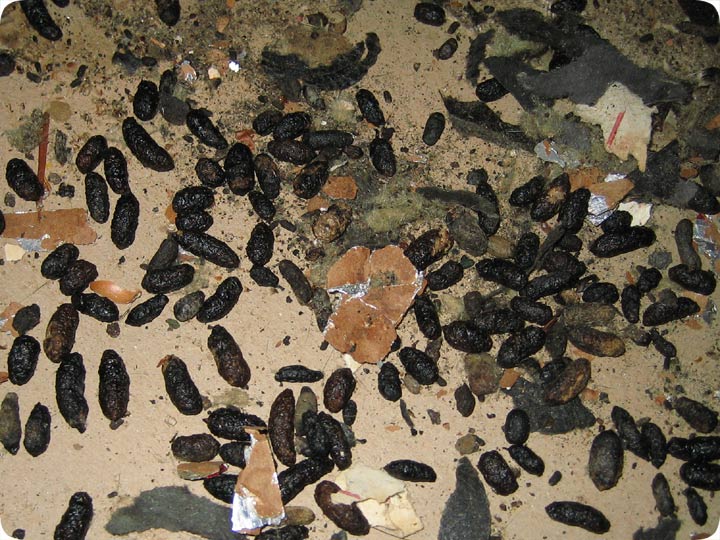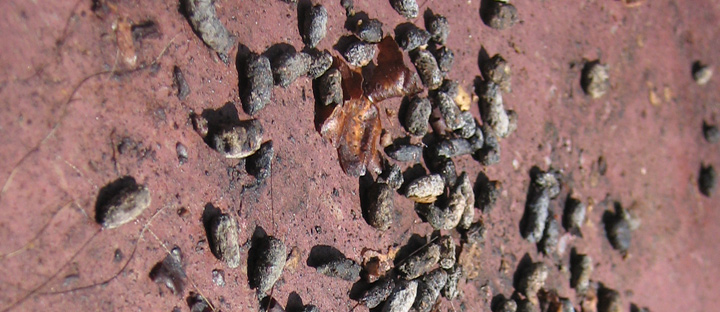
NEED LOCAL HELP? We are wildlife removal professionals servicing 95% of the USA. Click here to
hire our local squirrel removal expert in your home town. Updated 2021. But read the below advice first!
How Can I Get Rid Of Squirrel Feces And Urine?
If you have had the misfortune of experiencing a home invasion of squirrels you will, no doubt, have discovered that they cause a great deal of damage which can be extremely expensive to put right. If you have successfully managed to eradicate squirrels from your home and have also sealed it against possible re-invasion it is time to start the clean-up operation. This may be extensive and time consuming and it may be a good idea to use a professional cleaning company who can carry out a deep clean of the affected area.
You will most likely have noticed that there are vast amounts of squirrel feces and urine left behind in your attic. In common with most rodents squirrels tend to take a spray approach when expelling their waste, in fact, they urinate almost constantly as they run around - and, to make matters worse, it is thought that their urine contains pheromones which ‘signal' to other squirrels. It is essential then to ensure that your premises are thoroughly cleaned after any squirrel infestation, you may even have to replace your loft insulation to ensure you have disposed of all the waste matter. Whilst cleaning the area you should wear protective clothing and a mask to avoid inhaling any unpleasant fumes, also ensure that the area is well ventilated - but still squirrel proof!
Read more about How do I clean squirrel feces out of my attic?
Is There Any Danger Of Squirrel Disease For Humans?
If you have squirrels in your home and are investigating ways of getting rid of them one of your concerns is most likely wondering if there is any risk of squirrel disease for humans. Generally speaking there is little or no danger to humans from any disease carried by squirrels. As with all animals, squirrel feces can pose the threat of salmonella infection if handled without following good hygiene practices. Reports that squirrels can cause rabies in humans are anecdotal at best and there appears to be little conclusive evidence to support this theory.
Squirrels are known to carry fleas and ticks and it is these which may pose the threat of squirrel disease in humans. Ticks can cause tick fever in humans, once a squirrel, and its attendant ticks and fleas, leaves its nest, particularly in warmer weather, the ticks and fleas may well look for new living accommodation - on you or your pets. Once you have ticks or fleas in your home it is extremely difficult to get rid of them, they are likely to remain until long after the squirrels have gone unless you take the necessary steps to eliminate them from your carpets, furnishings, pets and pet bedding.
To learn more, read more about Is squirrel feces dangerous to touch or breathe?
Is There A Trick For Squirrels, Pheromones & Insulation
Many animals secrete pheromones as way of influencing other animals of the same species. Squirrels are known to secrete their pheromones along their favored runs letting their squirrel friends know that there is a great place to live nearby or a good store of food. The bad news for homeowners is that if you have squirrels then you also have the pheromones that are signaling a welcome party to the rest of your local squirrel population. What is worse is that if the squirrels are in your well-insulated attic the pheromones (along with fecal matter and urine) will be absorbed into the insulation.
If you have managed to resolve your squirrel problem, if you have removed them all and sealed your house to prevent re-entry then you need to clean the whole area. Because of the problem of pheromones in the insulation you may well need to replace the whole lot otherwise you may find squirrels making desperate attempts to get into your home and causing vast amounts of damage as they do so. Once you have removed the insulation, ensuring you wear the right protective gear as you do so, it needs to be properly disposed of and then the whole area should be cleaned with anti-bacterial cleanser and even a steam cleaner.
Can You Vacuum Up Squirrel Feces
Following a squirrel infestation, it is extremely important that you ensure your house is spotlessly clean and free from any trace of the pests, otherwise you risk of another group coming to live in your attic. Even if you get rid of the original culprits and their scent remains it can attract other squirrels and pests to the premises as a good place to live, nest and breed. This usually involves an exceptionally deep clean, going right into your wall cavities to check your insulation for signs or urine or feces. The feces of smaller rodents such as mice, rats and squirrels along with those of bats and birds cannot be removed by hand if you are realistic due to the size and nature of the droppings - they are often thousands in number, tiny and spread out over an area.
Squirrel feces that have been left in your attic or home should be vacuumed out, but you should use a filter vacuum if possible. It is important that you replace infected wall insulation as vacuuming will not effectively remove any fecal matter left in the wall. If the infestation has been particularly bad, you may need to hire an industrial cleaner with a high powered vacuum.
Click here for more information about squirrel urine and proper cleanup.
Read more about squirrel diseases and health risks from squirrels in a living space.
What does squirrel feces look like?
Squirrel feces look a little like much bigger rat droppings - long and oblong in shape, about 3/8 inch in length. If they're dark, they're fresh, and they get lighter in color as they age. They might look harmless, but they're actually very dangerous, and you will want to handle them with care. There are often disease spores passed on in the droppings and waste matter of wild animals, and with the squirrel, salmonella poisoning and leptospirosis are two diseases you will definitely need to concern yourself with. When removing the feces, you should use a filter vacuum if you can get hands on one, and make sure you're wearing the appropriate clothing and protective gear also. This means a face mask to prevent you from inhaling anything unpleasant, and thick rubber gloves. You will need to also ensure you're using a strong biological enzyme cleaner with bleach. This can help to get rid of the pheromones. These pheromones are what will attract other squirrels, and also other wild animals, if left. Feces are very often one of the first giveaways when you have wild animals living in your home, particularly with animals such as squirrels. They leave droppings that are bigger than animals such as rats and mice, and with regular inspections of your home, should be quite easy to spot. When was the last time you had a quick look around in your attic?

You have found the tell tale droppings from an animal or animals around your garage, attic, or other area of your home. Most of the time, when a homeowner finds droppings about, the first assumption of the majority of homeowners is that they have rats or mice. While that is a reasonable assumption, it is not always the correct one. It may well always be a different rodent...perhaps a squirrel? In case you did not know, squirrels are the most common home invader around the country. Before you jump to the conclusion that you have a rat or mouse infestation, learn how to identify animal "scat". Scat, like feces, or poop, is just another name for the droppings of animals. Knowing what animal infestation you might have is important in finding the right solutions to be rid of the pests. Here is a quick guide to help you differentiate between rodents.
At first glance you might see no difference in squirrel, mouse, and rat droppings. While they do look similar, there are subtle but obvious differences that make them easy to tell apart. Sometimes identifying the scat by the color of the droppings can help you figure out which member of the rodent family you are dealing with. You will immediately notice that squirrel droppings are much lighter in color than that of either mice or rats. This is due in part because of their food intake. Squirrels stick to a pretty centralized diet of nuts, berries and acorns with an occasional bug or larvae. Mice and rats are Opportunistic eaters that will consume anything they see that look edible, including each other and their young as well as things like soap, paper, and cloth. Mice and rats stools are most often noticeably darker in color, even appearing to be blackish or tar like. The droppings left behind by Squirrels are most often a light brown or brick red in color. Another clue is the shape of the scat.
Feces left behind by squirrels will have a rather distinctive barrel-like configuration, as well as being noticeably larger than that left by mice or rats. The ends of squirrel droppings will appear to be even and rounded at the ends as opposed to other rodent scat which looks rather "pointy". The appearance of the texture of squirrel scat is also different. Squirrel scat looks to be smooth. It appears to be even throughout the length, level on the surface. Rat and mouse droppings often look grainy and are a little more oblong and rectangular with tapered pointy ends that you don't see in the droppings of a squirrel. Where you find the scat dropped can matter as well. Squirrel droppings, are normally clustered together in a certain area. Squirrels are, usually much more discreet than their coarser cousins.
Rat and mouse droppings are more plentiful and often seem to be scattered about the area everywhere. You will only find massive concentrations of mice and rat poop mixed with the greasy residue that marks the entrance to their nests, or in their nest proper. One thing that is the same with all members of the rodent family is the sheer quantity of droppings. Rodents chew nonstop, and consume large amounts of matter. This means that as a group they tend to pass stools in massive amounts throughout the day. Frequent elimination is a natural result of their need to constantly chew and eat.
Go back to the Squirrels in the Attic home page.
NEED SQUIRREL REMOVAL HELP? We service over 150 USA cities. click gere to hire us in your home town. Updated 2021.